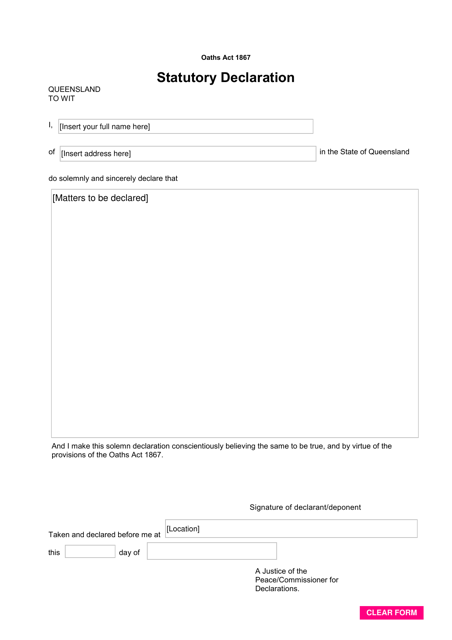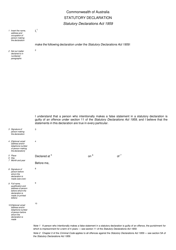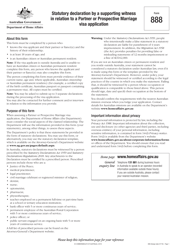Statutory Declaration - Queensland, Australia
A Statutory Declaration in Queensland, Australia is a written statement made voluntarily by an individual, declaring that the information provided is true and correct to the best of their knowledge. It is typically used as a legal document to verify facts or details for various purposes such as confirming identity, providing evidence, or making declarations for official matters. This declaration is legally binding and may be required in situations where a verbal statement is not sufficient or when there is a need for a written statement under oath.
In Queensland, Australia, a statutory declaration is usually filed by the person making the declaration. This declaration is a legally binding statement made under oath or affirmation, affirming the truthfulness of certain facts. It is commonly used in various legal, government, or administrative procedures, such as applying for government benefits, obtaining permits, or supporting a claim. However, it is important to note that the specific requirements and procedures for filing a statutory declaration may vary depending on the purpose and the relevant authority involved.
FAQ
Q: What is a Statutory Declaration?
A: A Statutory Declaration is a written statement made under oath or affirmation that declares the truthfulness of the facts stated in the document.
Q: What is the purpose of a Statutory Declaration in Queensland, Australia?
A: In Queensland, Australia, a Statutory Declaration is commonly used to officially declare certain facts or circumstances. It is often required for various legal and administrative purposes, such as applying for government benefits, making official statements, or providing evidence in specific situations.
Q: Who can make a Statutory Declaration in Queensland, Australia?
A: In Queensland, Australia, any person who is over the age of 18 and has the mental capacity to understand the nature and consequences of the Statutory Declaration can make one. This includes Australian citizens, permanent residents, and even certain non-residents under specific circumstances.
Q: What information is typically included in a Statutory Declaration?
A: A Statutory Declaration usually includes the declarant's full name, address, occupation, and the details of the facts being declared. The document must be signed and witnessed by an authorized person who confirms the identity of the declarant.
Q: Who can witness a Statutory Declaration in Queensland, Australia?
A: In Queensland, Australia, a Statutory Declaration must be witnessed by an authorized person, such as a Justice of the Peace (JP), a Commissioner for Declarations, a lawyer, or a notary public. The authorized person certifies that they have witnessed the signing of the declaration and confirms the declarant's identity.
Q: Is there a specific format for a Statutory Declaration in Queensland, Australia?
A: Yes, there is a specific format for a Statutory Declaration in Queensland, Australia. It must follow the prescribed form as outlined by the Statutory Declarations Act 1959 (Cth) and be written on plain paper.
Q: Are there any penalties for making a false Statutory Declaration?
A: Yes, making a false Statutory Declaration is a serious offense in Queensland and Australia in general. It is considered perjury and carries penalties, including fines and imprisonment, depending on the severity of the false statement.
Q: Can a Statutory Declaration be used as evidence in court?
A: Yes, a properly executed and witnessed Statutory Declaration can be used as evidence in court proceedings in Queensland, Australia. However, it is always advisable to consult with legal professionals if specific legal advice is required.
Q: Can a Statutory Declaration be used outside of Queensland, Australia?
A: Yes, a Statutory Declaration made in Queensland, Australia, can generally be used in other parts of Australia as well. However, the acceptance and recognition of a Statutory Declaration may vary depending on the specific requirements of each jurisdiction.



